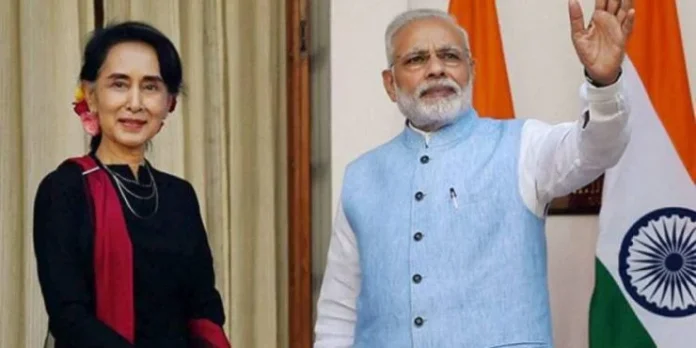The February 1 coup in Myanmar leading to the country being taken over by the Tatmadaw (Myanmar Military) and placing under house arrest the leader of the National League for Democracy (NLD) Aung San Suu Kyi has indeed put India in a rather delicate situation having to support democracy and at the same time pursue strong security and development interests.
With the BJP-led NDA government of Prime Minister Narendra Modi pursuing a vigorous policy of strengthening relations with neighbours and with Myanmar specifically as part of its Look East policy and to deal with the menace of insurgency in the North East as four states – Arunachal Pradesh, Nagaland, Mizoram and Manipur – have border with Myanmar, the government has to walk a very sensitive path.
Days after Myanmar reverted to military rule following a coup, India pushed back against the West’s attempts to resort to tough measures against the country in closed-door discussions in the UN Security Council.
There was no official statement on the discussions, largely because China and Russia discouraged the move.
The external affairs ministry said it is monitoring the situation closely and joined countries around the world in expressing concern at the military coup in Myanmar and detention of de facto leader Aung Saan Suu Kyi, and said the rule of law and democratic process must be upheld.
The external affairs ministry said in a brief statement it was monitoring the situation closely after Myanmar’s military seized power by ousting the democratically elected government of Suu Kyi, who was held with other leaders of her NLD party in early morning raids.
Even though there has been no communication between New Delhi and the ruling Tatmadaw (Myanmar military) since the coup, India plans to continue its development activities particularly in the sensitive Rakhine state, where it is building the Sittwe port and homes for the Rohingya.
The US has already called it a “coup” leaving the door open for potentially more sanctions. Going by the experience of the past decades, it has become clear that sanctions don’t actually work, particularly in already introverted societies like Myanmar. But sanctions might push Myanmar closer to the Chinese. It is believed that one of the reasons for the military to open up to democracy in 2010-2011 was to reduce their dependence on China.
China and Russia have taken a non-committal approach to the coup while ASEAN made a muted call for “dialogue, reconciliation and return to normalcy.” Japan called it a “coup” but Chief Cabinet Secretary Katsunobu Kato talked of continuing with economic assistance and said, “We will consider our response while we keep watching the situation.” The western countries, including Australia and the US have issued strong statements with threats of sanctions.
India is treading cautiously and understandably so since it wants to remain engaged in Myanmar as many insurgent groups find haven in Myanmar which means India needs its help to counter them. Similarly, India can make common cause with the military to counter the fact that China supports the Arakan Army which has targeted the Indian Kaladan project, including briefly kidnapping some personnel. Most important India wants Myanmar to counter the biggest security threat – Chinese support with arms to the Wa army, which undermines its (Myanmar) forces, as well as help arm other insurgent groups in Myanmar and India.
As historian Thant Myint U, tweeted, “The Myanmar generals have always been motivated by power not wealth…. Their creed is nationalism and their dream is to end the country’s 75-year old civil war on their terms. Any effective international approach will also need to understand the unique psychology of Myanmar’s political elites, shaped by decades of violence, isolation, poverty, and oppression as well as the deeply conservative and hierarchical nature of its mainly Buddhist society.”
For India, engagement with Myanmar is vital. It was not for nothing that foreign secretary Harsh Shringla travelled to NayPyiDaw together with army chief Gen MM Naravane in October. New Delhi recognised the importance of maintaining a two-track engagement, acknowledging the primacy of the army in Myanmar’s affairs.

The coup did not surprise those watching developments in Myanmar closely for as they said that since the November elections, there was a sense of unease among the military, an apprehension that Aung San Suu Kyi-led civilian leadership might diminish their role.
Bilahari Kausikan, former permanent secretary of Singapore’s foreign ministry, said, “As developments in Myanmar play out, it would be prudent for the US and ASEAN not to forget that no external party has much influence in Myanmar and that Myanmar’s future lies in its hands.”
The military said it had taken control of Myanmar for a year under a state of emergency to investigate what it described as “huge discrepancies” in the voters’ lists used for the general election last November. NLD had easily won the election, securing 83 per cent of available seats in the two houses of Parliament, while the pro-military Union Solidarity and Development Party (USDP) won just 33 seats.
The US said it was alarmed by the military undermining the democratic transition in Myanmar and urged all parties to adhere to democratic norms. White House spokesperson Jen Psaki said the US “opposes any attempt to alter the outcome of recent elections or impede Myanmar’s democratic transition, and will take action against those responsible if these steps are not reversed.”
Bangladesh, which has warily followed developments in Myanmar as they will affect efforts to repatriate more than a million Rohingya refugees to Rakhine state, called for upholding the democratic process and constitutional arrangements.
A statement from the foreign ministry in Dhaka said: “We have been persistent in developing mutually beneficial relations with Myanmar and have been working with Myanmar for the voluntary, safe and sustained repatriation of the Rohingyas sheltered in Bangladesh. We expect these processes to continue in right earnest.”
China, which views Myanmar as a vital part of its Belt and Road Initiative, called on all parties to “resolve their differences under the constitutional and legal framework to protect political and social stability.”
Another concern for India is the Chinese attempts to woo Myanmar as it considers that country to be a key to boost its BRI and so there is a view that contacts with Myanmar’s military would help balance China’s influence within the neighbouring country. This is one of the reasons why the Indian side has not publicly criticised Myanmar’s handling of the Rohingya crisis.
Former ambassador Rajiv Bhatia, who served as India’s envoy to Myanmar during 2002-05, said the military seizing power was the outcome of an array of fault lines related to politics, ideology and personality, and India’s response will be guided by past lessons.
“The first reaction will be concern that democracy has suffered a setback. But then the reality of hardcore security and strategic interests will come into play and there will be a balance between India’s principles and interests. While expressing faith in democracy, we will find a way to deal with those who wield power in Myanmar,” he said.
It would be of interest to recall that three weeks before Myanmar’s military commander took power in a coup, he met the Chinese government’s top diplomat in an exchange that pointed to potential support as Myanmar faces the prospect of renewed Western sanctions.
China’s foreign ministry noted the “fraternal” relationship as State Councillor Wang Yi met last month in Myanmar’s capital with the military chief, Senior General Min Aung Hlaing, making him one of the last foreign dignitaries to visit before the coup.
“China appreciates that the Myanmar military takes national revitalisation as its mission,” the Chinese ministry said at the time.
Myanmar’s own readout of the meeting proved more portentous.
It noted that the military raised complaints to Wang about Myanmar’s November 8 election, saying it was marred by fraud, including “discrepancies with the voter lists,” and told him what the army was doing about it, without giving specifics.
Since the February 1 coup and the arrest of elected-leader Aung San Suu Kyi, China has stayed largely quiet, saying only it hoped for stability in a country where it ranks as the dominant trading partner, a major investor and a counterweight over years of pressure on Myanmar from the West over its suppression of democracy.
Chinese state media has largely held off commenting on what the coup means for China, or even using that word, with state news agency Xinhua referring to February 1 events as a “major Cabinet reshuffle.”
Stability-obsessed China has deep ties to a military that ruled Myanmar for decades.
China has declined to say whether it was given warning that a coup was coming, but analysts played down the notion that last month’s meeting had a bearing on events, or that Myanmar gave notice of the takeover.

“Myanmar’s tumultuous transition to democracy in the past decade has greatly impacted China’s economic interests in the country,” said Li Mingjiang, associate professor at the S. Rajaratnam School of International Studies at Nanyang Technological University in Singapore.
“More than anything, China would’ve wanted stability in Myanmar, not a coup,” he said.
China is well-connected in Myanmar following years of backing the old military government when it was subject to sweeping Western sanctions after Suu Kyi was put under house arrest in 1989 following pro-democracy protests.
China later worked hard to build ties with Suu Kyi as political change swept the country, and she tried to reassure China that she did not consider it an enemy, visiting China several times and backing President Xi Jinping’s extensive Belt and Road Initiative of energy and infrastructure projects.
“As a neighbour on China’s southern border, a split Myanmar in turmoil is obviously not what China wants to see,” the ruling Communist Party’s official People’s Daily said in its overseas edition’s WeChat account.
For its part, Myanmar has lingering suspicion of China’s links with some militia forces that operate on the Myanmar side of their common border, and historically, Myanmar nationalists have viewed their huge neighbour with wariness.
Maw Htun Aung, a mining expert turned politician from Myanmar’s Kachin State bordering China, who is aligned with neither the army nor Suu Kyi’s ousted government, distrusted China’s motives.
“It will take advantage of the crisis and will mainly focus on its political gain and regional influence,” he said.
-The writer is a senior journalist and media consultant. Views expressed are personal and do not necessarily reflect the views of Raksha Anirveda
– The writer is a senior journalist and media consultant. The views expressed are of the writer and do not necessarily reflect the views of Raksha Anirveda.










